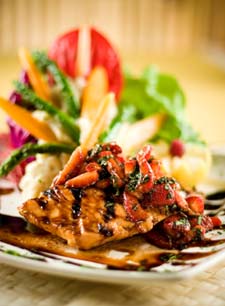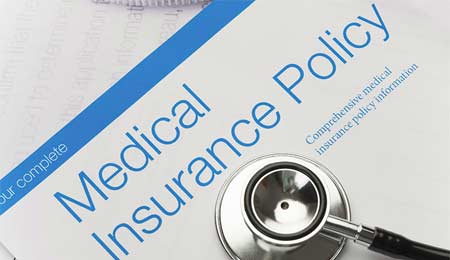Gastric Bypass Diet
Gastric bypass surgery is an effective weight loss treatment for morbid obesity, but it requires a commitment from the patient to adopt dietary changes and learn new eating habits. Even though the restrictive aspect of gastric bypass will control eating and the malabsorptive effect will reduce calorie absorption, the success of gastric bypass surgery is primarily determined by the foods you choose to eat.
Diet Progression
Your diet will change even before surgery takes place. The pre-op diet will prepare your body for surgery by increasing protein intake and reducing daily calories. It will also help you ease into the changes that will be required after gastric bypass surgery.

Immediately after surgery your diet will be limited to liquids. As your body recovers from surgery, you will progress from liquids, to purees, then to soft foods, until you are finally able to handle solid foods. Recovery will vary from patient to patient, but it can take up to three months for the body to heal.
Recovery diet includes:
- Liquids (few days): water, broth, tea, milk, diluted non-acidic fruit juices, artificially sweetened non-carbonated beverages, protein drinks
- Purees (few weeks): food without chunks, including blended soups, pureed foods, low-fat yogurt, gelatin, cream of wheat, cottage cheese
- Soft foods (about 8 weeks): foods that are tender and easy to chew, including canned or fresh soft fruit without skin, well-cooked and tender vegetables, scrambled eggs, ground or finely diced meat
Your bariatric surgeon will carefully monitor your recovery and diet progression and provide you with specific dietary guidelines to aid recovery, promote good health and cause satisfactory weight loss.
Dietary Guidelines
The following information is a general overview of the gastric bypass diet and the required eating behaviors, but as specific guidelines can vary for each patient, it is important for you to follow the diet instructions given to you by your bariatric surgeon and nutritional advisor.

- The various gastric bypass procedures are similar in the respect that they all reduce the functional volume of the stomach and alter the body's response to food.
In RNY gastric bypass procedures, a smaller stomach pouch is formed in the upper portion of the stomach and a new stomach outlet (stoma) is formed. After the intestine is divided, the lower intestine is connected to the new stomach outlet. The remaining "remnant" lower stomach, the natural stomach outlet (pyloric valve), and the upper portion of the small intestine are all bypassed. The length of either section of the intestine can be made shorter or longer to affect the levels of absorption.
- Gastric bypass surgery will require you to adopt a whole new attitude about eating.
After gastric bypass diet, eating is focused on providing the body with healthy proteins and nutrient rich foods. Protein is necessary for maintaining muscle tissue and burning fat reserves. The diet will eliminate any unhealthy foods that add calories to the diet without providing any significant nutritional benefit. Since the amount of food eaten each day is very limited, every bite counts. It is important to eat only healthy and nutritious food.
- Calories per day: 800 for the first 1 to 2 years during weight loss, 1000 - 1200 per day thereafter for weight maintenance
- Protein grams per day: 50 to 60 grams for women and about 60 to 70 grams for men
- Meals will primarily consist of protein-rich foods, including lean meats (chicken, turkey, fish), low-fat dairy products (yogurt, cottage cheese), eggs, and soy products
- Include a variety of nutrient-rich fruits and vegetables
Foods to Avoid
Your diet should not include sugary foods or high-fat foods which add excessive calories to the diet without providing any nutritional benefits.
- Sugary foods (candy, ice-cream, cookies, cakes, syrups)
- High-fat foods (chips, fried foods, sausage, cream soups, sauces, gravies, margarine, mayonnaise, junk food)
You will also want to avoid fibrous foods and other problematic foods which can cause eating discomfort or digestive difficulties.
- Fibrous foods (asparagus, pineapple, rhubarb, oranges, dried fruit)
- Other problematic foods (tough or overcooked meats, doughy breads, pasta, rice, skins and seeds of fruits and vegetables, nuts and popcorn)
Nutritional Supplements
Nutritional supplements are necessary to supply the body with the vitamins and minerals it needs to function properly and prevent deficiencies that lead to serious health consequences. Generally, patients will need to take a multi-vitamin, multi-mineral, B-complex (for B12), calcium, and iron (for menstruating women).
Protein supplements, such as whey protein powder, whey isolate (for lactose intolerant), lactaid milk, soy milk or other soy products, may also be advised to meet protein requirements.
Dumping Syndrome
Dumping syndrome occurs when food enters the bloodstream too quickly. It is a common effect of gastric bypass surgery because the natural stomach outlet (pyloric valve) has been removed and food enters the small intestine more quickly. Gastric bypass patients commonly experience dumping syndrome after eating sweets or high-fat foods, eating too much food, or drinking fluids with meals.
- The symptoms of dumping syndrome are nausea, abdominal cramping, headache, sweating, weakness, faintness, and eventually diarrhea.
Since dumping syndrome usually results from eating high calorie foods, it controls the intake of sweets, fried foods, and fatty foods. Depending on how you view this effect, dumping syndrome can be either an advantage or disadvantage of gastric bypass surgery.
Eating Habits & Behaviors
After gastric bypass surgery, not only will your diet change, but so will the way you eat. Because your stomach size is smaller and the digestive system is altered, you will not be able to eat the way you did before surgery.
Eat Small Amounts
- Immediately after surgery the stomach will only hold about 1 ounce of food
- Three months after surgery, due to stretching, the stomach will hold about 1 cup of food
- Stop eating when you feel full, even if you have eaten only a few bites of your meal, as overeating can cause nausea, vomiting, and stretch the stomach pouch
Eat Slowly
- Take the time to chew food completely, as your body is not able to break down foods that have not been chewed to a liquid consistency
- Eating too fast can cause nausea and vomiting
- It will take about 30 minutes to eat a meal, even though it is only a small amount of food
Schedule Meal Times
- Set a time for three meals a days and eat only at those scheduled meal times
- Do not skip meals
- Do not snack between meals
Drinking Liquids
- Do not drink liquids with meals or within 30 minutes before or after a meal
- If you drink liquids with meals, it may force food through your stomach pouch too quickly, causing dumping syndrome and increasing hunger between meals
- Drink plenty of liquids, about six to eight cups a day, to keep from becoming dehydrated
- Drink slowly, about 30 to 60 minutes for one cup of liquid, to prevent dumping syndrome
- Acceptable liquids include water, tea, sugar-free and calorie-free flavored drinks, some sport drinks
- Avoid carbonated beverages, as they may cause gas, bloating, pain, and enlargement of the small stomach pouch
- Avoid alcoholic beverages, as they add excess calories to the diet, may cause dumping syndrome, and can lead to addiction
Related Articles
Social
Eat Healthy!
Eating healthy requires choosing the right types of food as well as controlling the amount of food that is eaten. Read the Nutritional Facts label on packaged foods to find out serving size, calories, and nutrient information.




